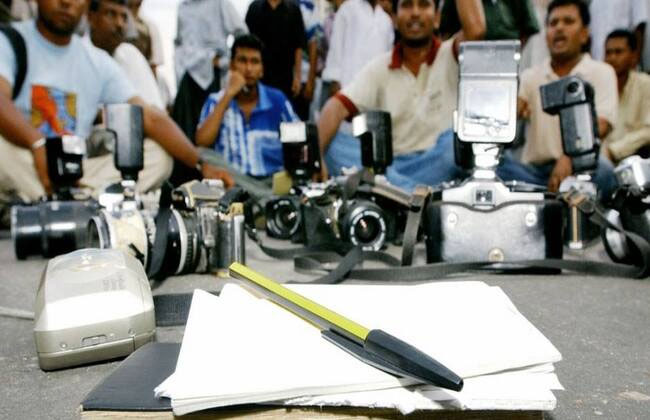
On the third anniversary of The News Times, a conversation on the role of the media becomes necessary. The role of the media in the present-day world cannot be ignored or overlooked. Indeed, this role has been manifesting itself over the last many decades, not just in Bangladesh but around the world as well.
We go back to history, given that this is the month when history underpinned the idea of Bangladesh. In March 1971, a few days after the crackdown on an unarmed Bengali population by the Pakistan army, the young British journalist Simon Dringhad the earliest of news reports on an unfolding genocide appear in the British media. That was the beginning, a time when the world began to take notice of what was going on in East Bengal, soon to be Bangladesh.
In June of the same year, the Pakistani journalist Anthony Mascarenhas, having observed conditions in military-dominated East Bengal as part of a media team sent over to the region by the Yahya Khan junta, flew to Britain and submitted his revealing article to the Sunday Times newspaper. It was an explosive piece, one that exposed Pakistan’s actions before the world fully and absolutely. From then on, the media, especially in the West, focused unwaveringly on the genocide in Bangladesh and continued to do so until December 1971.
That was journalism in its informative role. It informed the world of a grave wrong being perpetrated in an important part of the globe.
The extent to which the media in our times exercises a huge degree of influence on the issues, anywhere in the world, is to seen through a study of the career of the famous American journalist Walter Lippmann. Initially a supporter of President Lyndon Johnson’s policies on Vietnam, Lippmann at one point decided to visit Vietnam and study the actual situation there. What he saw there did not please him.
Lippmann came back home and in his regular newspaper column made it clear that America was not winning the war in Vietnam. President Johnson read the article and went into deep reflection. If Lippmann thought America was losing the war, the President told his aides, then America was truly losing the war.
The old cliché that the media is the fourth estate still stands. In recent years, here in Bangladesh, journalism has taken on greater significance given that a proper, strong and productive parliamentary system is yet to develop. It remains a matter of regret as also encouragement that where people should be approaching their local lawmakers to apprise them of their individual and collective problems, they rather turn to the media for a redress of the issues they confront in life.
Stories of corruption and malfeasance and myriad instances of wrongdoing are reported to the media and by it, more as a way of emphasizing the need for wrongs to be righted than as mere pieces of information for people. We can cite here the very constructive and positive role our media has played in the past manydecades especially in highlighting the need for some of the darkest laws and some of the most difficult impediments before us to be removed.
For years the media in Bangladesh struggled for a repeal of the notorious Indemnity Ordinance. A time came when a people’s government responding to public expectations and media calls as well as the call of conscience, did away with this black law.
The media has waged a long battle for the killers of the Father of the Nation to be brought to justice. They have been brought to justice.
For years together, the Bangladesh media focused on the crimes committed by a number of rehabilitated collaborators of the Pakistan army in 1971. Despite the fact that two military regimes and a quasi-military regime in the country gave those collaborators high places in national politics, the media consistently emphasized their old crimes and the need for them to be brought to justice.
They have been brought to justice. Citizens have breathed a sigh of relief.
The role of the media in present times is, therefore, a demanding one. Observe the world around us. Journalists have put themselves under enormous pressure while trying to come upon the truth.
But true journalists, in our times, know that their calling is one where courage and truth are demanded. No, the media is not a challenge to government. Newspapers and news outlets which advocate an imposed political system from the top do no service to themselves or to the country.
The responsibility of the media in the present-day world is simple and yet complex. It is not, it must not be, a challenge to government. But it must never recoil from the responsibility of pointing out the flaws of authority, indeed of any individual or organization which is seen to be transgressing its remit or committing plain wrong.
The media in these days of growing illiberalism around the world must be a keeper of people’s conscience. Its job is to refute the lies dished out by medieval outfits. Equally necessary is the need for the media to expose demagoguery wherever it threatens to undermine democracy and decency in private and public life.
The media does not play God. Nor does the media remain true to itself when it kowtows before forces more powerful than itself. It is its true self when it casts fear and favouritism aside and goes forward to unearth the truth behind everything. The media must dig deep. It cannot be shallow if it means to make an impression on people’s minds and lives.
That is the power of the media in our world. That is its role in the times we live in.
In our times, we have the very vivid examples of how the media have delved into such issues as Iraq. There is little question that some media outlets in the West have indulged in embedded journalism in such volatile regions as Iraq. But observe the larger picture. It was the media which exposed the lie of the WMDs through relentless investigative reporting. No more was there a complacent media, ready to take information handed down by the establishment.
The media remains a watchdog in very important ways. The example of how the media, in almost every nation around the globe, has pointed out the evils perpetrated by the so-called Islamic State or ISIS is a vibrant instance of journalism as a force for public good in these dangerous times. On a different level, the many ways in which the media in the US and in other countries has exposed the vacuity and political poverty of the Donald Trumppresidency between 2017 and 2021 demonstrates the unwillingness of journalism to take nonsense lying down. Even in Bangladesh, as we have all noticed, the media has played a particularly vigorous role in taking politicians and administrators to task over policies and their implementation or otherwise.
Last but not least, here in Bangladesh — where journalism has played an expansive role in these past many decades and continues to explore newer and larger avenues for itself — the media has systematically and persuasively drawn attention to the menace posed to national security by such outfits as the JMB, the Jamaat-e-Islami, the HizbutTahrir and their foreign patrons. Note the manner in which the media has done the job. It has roundly condemned terrorism and has consistently sought to draw public attention to the danger, even when its practitioners have come under the wrath of dark forces.
The bottom line is clear where the role of the media in today’s world is concerned. The media is no more a record of what happens in the world or in particular countries. Its reports have an interpretative function in the sense that they point to the possibilities as well as drawbacks which governments might be epitomizing. Today the media is in its true element as the Fourth Estate — because it has taken upon itself the responsibility of keeping watch on national security, on regional issues and on global conflicts.
The media in our times is not the government. Nor is it a challenge to the government. But it can be complementary to the work of the government. Above all, it is a twenty-four-hour articulation of popular aspirations around the world. It works, everywhere, in the enlightened interest of nations.
At The News Times, let such enlightenment work and be passed on to readers.


